
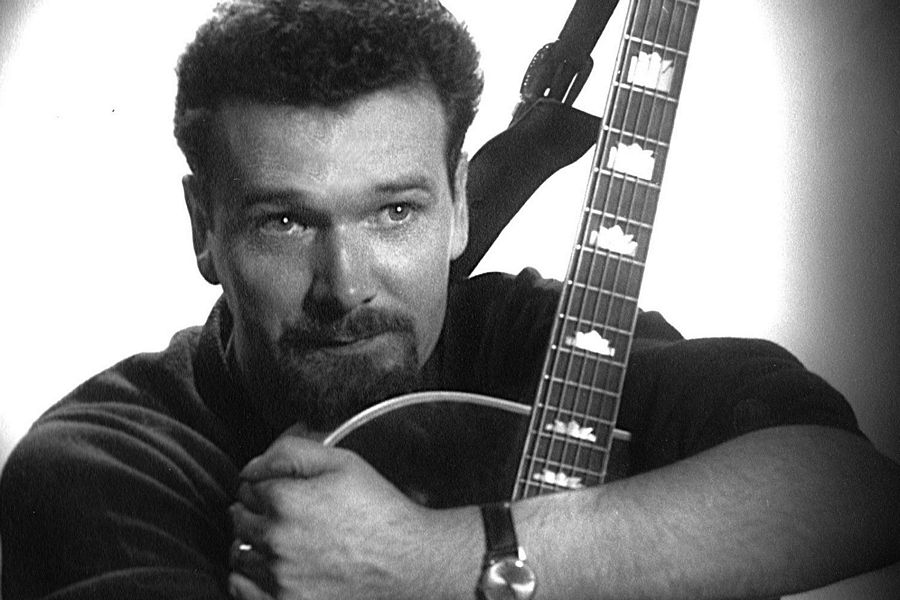
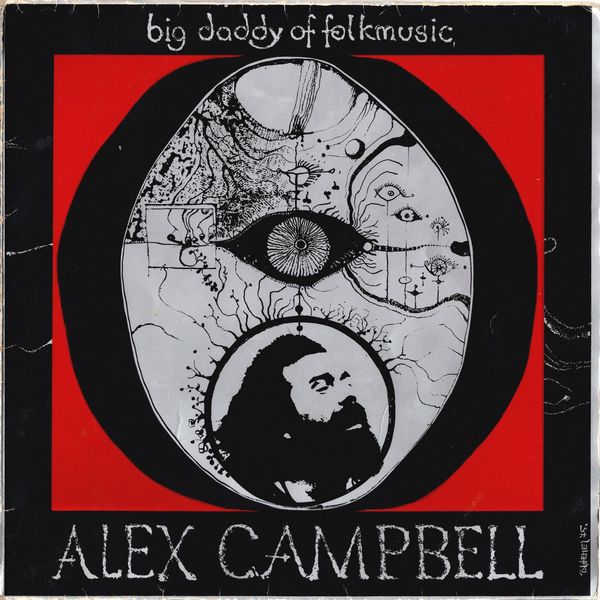 |
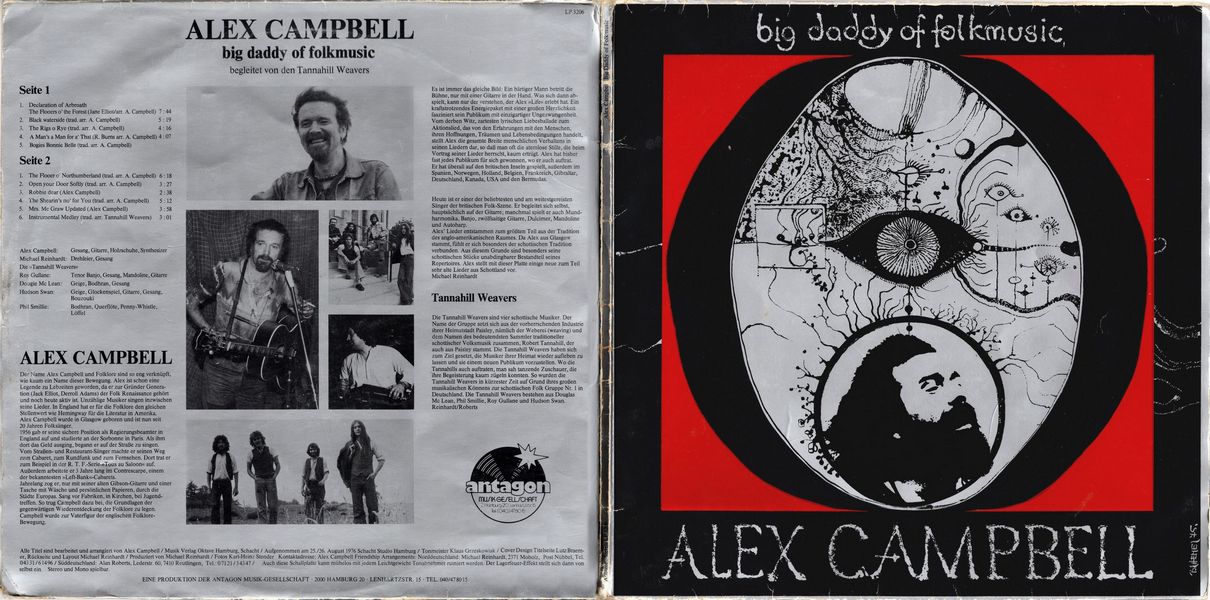
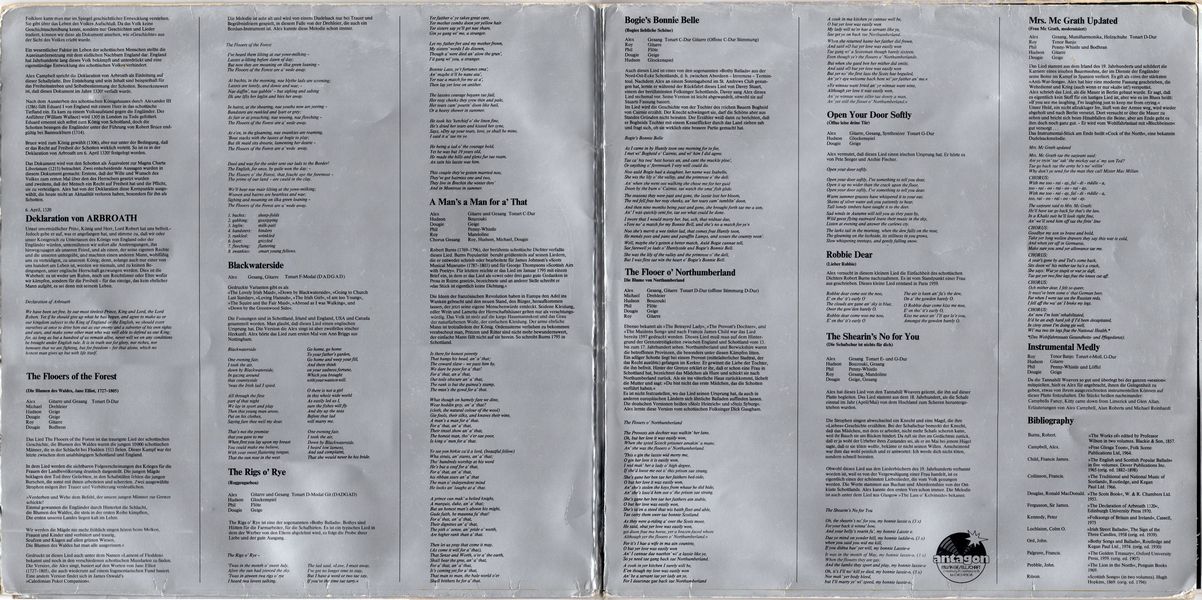 |
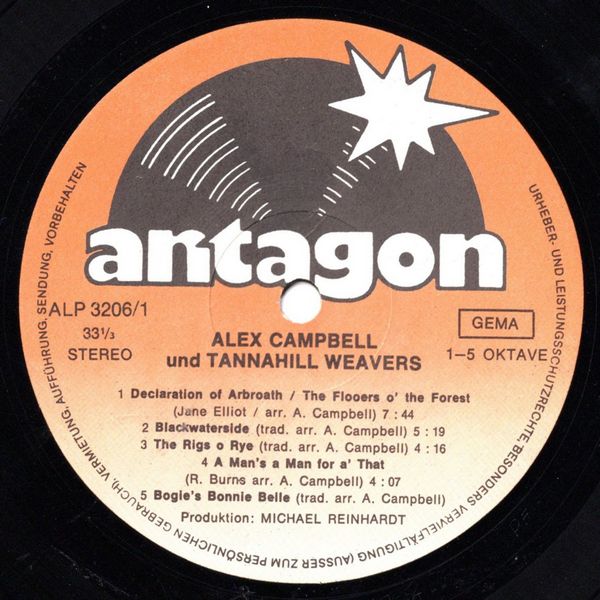
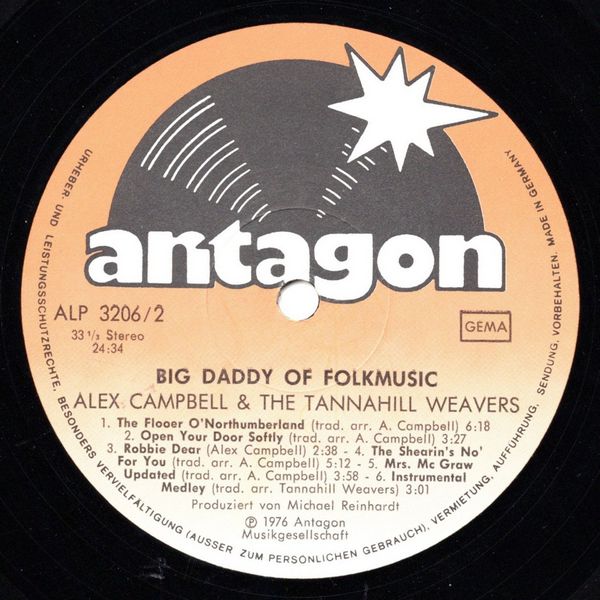
|
ALEX CAMPBELL
The name Alex Campbell and folklore are more closely linked than almost any other name of this movement. Alex has already become a legend during his lifetime, as he belongs to the founding generation (Jack Elliot, Derroll Adams) of the Folk Renaissance and is still active today. Countless musicians now sing his songs. In England he has the same status for folklore as Hemingway has for literature in America. Alex Campbell was born in Glasgow and has been a folk singer for 20 years.
In 1956 he gave up his secure position as a government official in England and studied at the Sorbonne in Paris. When he ran out of money there, he began to sing in the street. From street and restaurant singer he made his way to cabaret, radio and television. There he appeared, for example, in the R. T. F. series "Tous au Saloon". He also worked for 3 years in the Contrescarpe, one of the most famous "left bank" cabarets.
For years he wandered through the cities of Europe with only his old Gibson guitar and a bag with laundry and personal papers. Sang in front of factories, in churches, at youth meetings. In this way Campbell helped lay the foundations for the current rediscovery of folklore. Campbell became the father figure of the English folklore movement.
It's always the same picture: a bearded man enters the stage, only with a guitar in hand. What then happens can only be understood by those who have experienced Alex "Life". A vigorous package of energy with great cordiality fascinates its audience with its unique ease. From the crude joke, the tenderest lyrical love ballad to the action song, which is about the experiences with people, their hopes, dreams and living conditions, Alex depicts the entire breadth of human behavior in his songs, so that one can often hear the breathless silence that comes with his Songs prevail, hardly endured. Alex has won almost every audience so far, wherever he has appeared.
He has played all over the British Isles, also in Spain, Norway, Holland, Belgium, France, Gibraltar. Germany, Canada, USA and Bermuda. Today he is one of the most popular and widely traveled singers on the British folk scene. He accompanies himself, mainly on the guitar; Sometimes he also plays the harmonica, banjo, twelve-string guitar, dulcimer, mandolin and autoharp.
Alex' songs come for the most part from the tradition of the Anglo-American region. Since Alex comes from Glasgow, he feels particularly attached to the Scottish tradition. For this reason, his Scottish pieces in particular are an indispensable part of his repertoire. With this record Alex introduces some new, partly very old songs from Scotland.
Michael Reinhardt
Tannahill Weavers
The Tannahill Weavers are four Scottish musicians. The group's name is derived from the predominant industry in their hometown of paisley, namely weaving, and the name of the most important collector of traditional Scottish folk music, Robert Tannahill, who also comes from paisley. The Tannahill Weavers have set themselves the goal of reviving the musicians of their homeland and introducing them to a new audience. Wherever the Tannahills performed, one saw dancing spectators who could hardly contain their enthusiasm. Thanks to their great musical ability, the Tannahill Weavers quickly became the number 1 Scottish folk group in Germany. The Tannahill Weavers consist of Douglas McLean, Phil Smillie, Roy Gullane and Hudson Swan.
Reinhardt / Roberts
Folklore can only be understood in the mirror of historical development. It gives information about the life of the people. Since the people know no historiography, but only pass on stories and songs, we can view these as a document of how "history" was experienced from the people's point of view.
An essential factor in the life of the Scottish people was the conflict with their southern neighbor England. For centuries England fought and oppressed this people and prevented the Scottish people from developing independently.
Alex Campbell speaks the Arbroath Declaration as an introduction on this record. Its creation and its content are exemplary for the striving for freedom and self-determination of the Scots. It is noteworthy that this document was published in 1320! was written.
After the extinction of the Scottish royal family by Alexander III (1286), Edward I of England invades the Scottish Lowlands with an army. There was a popular uprising against the English. The leader (William Wallace) is tortured to death in London in 1305.
Edward proclaims himself King of Scotland, but the Scots finally defeat the English under the leadership of Robert Bruce at Bannockburn (1314).
Bruce is elected king (1306), but only on the condition that he really represents the right to freedom of the Scots. So, it is in the declaration of Arbroath on April 6th, 1320! has been established.
The document is considered by the Scots to be equivalent to the Magna Charta Libertatum (1215). Two decisive statements were made in this document: first, that the will and desire of the people were for the first time overruled that of the ruler, and second, that man has a right to freedom and the duty to defend it. Alex selected these key points from the declaration that have not lost their relevance today, especially for him as a Scotsman.
April 6, 1320
Declaration of Arbroath
We have been set free, by our most tireless Prince, King and Lord, the Lord Robert. Yet if he should give up what he has begun, and agree to make us or our kingdom subject to the King of England or the English, we should exert ourselves at once to drive him out as our enemy and a subverter of his own rights and ours, and make some other man who was well able to defend us our King; for, as long as but a hundred of us remain alive, never will we on any conditions be brought under English rule. It is in truth not for glory, nor riches, nor honors that we are fighting, but for freedom — for that alone, which no honest man gives up but with life itself.
The Flooers of the Forest (Jane Elliot, 1727-1805)
The song The Flooers of the Forest is the saddest song in Scottish history; the flowers of the forest were the 10,000 young Scottish men who died in the Battle of Flodden in 1513. This battle was the last between independent Scotland and England.
In the song the visible consequences of the war for the women of the rural population are presented in a drastic manner. The young maids mourn the death of their mistresses, the young lads who otherwise worked and joked with them are absent from the sheepfolds. Two selected stanzas may illustrate their sadness and bitterness.
"Do ruin and woe to the order that sent our young men to the frontier!
Once the English won the battle by trickery, the flowers of the forest,
who always fought in the front row,
The first of our country are cold in the clay.
We will never again hear the maids sing happily while milking, women and children are bitter and sad.
Sighs and complaints in all the green meadows,
The flowers of the forest have all been torn up. "
In print, this song is also known under the name "Lament of Flodden" and can still be found in the various Scottish dialects. The version Alex sings is based on the words of Jane Elliot (1727-1805), which in turn is based on a fragmentary find. Another version can be found in James Oswald's "Caledonian Pocket Companion". The melody is very old and is only played by a bagpipe at funerals and funerals, in this case by the hurdy-gurdy, which is also a drone instrument. Alex always knew this melody.
Blackwaterside
There are printed versions as "The Lovely Irish Maid", "Down by Blackwaterside", "Going to Church Last Sunday", "Loving Hannah", "The Irish Girl", "I am too Young", "The Squire and the Fair Maid", "Abroad as I was Walking", and "Down by the Greenwood Side".
The versions have been collected in Scotland, Ireland and England, USA and Canada. This song is believed to have an English origin. The version Alex sings is undoubtedly of Irish origin. Alex first heard the song from Ann Briggs of Nottingham.
The Rigs o' Rye
The Rigs o 'Rye is one of the so-called" Bothy Ballads ". Bothys are huts for the farm workers, for the shepherds. It is a typical song in which the recruiter is rejected by the parents, it follows the test of their love and the good outcome.
A Man's A Man for A 'That
Robert Burns (1769-1796), the famous Scottish poet wrote this song. Burns popularity is largely based on his songs, which he either wrote or arranged for James Johnson's Scots Musical Museum (1787-1803) and for George Thompson's Scottish Airs with Poetry. For the latter, he submitted the song in January 1795 with a letter in which he described the song as "two or three very good ideas in prose put into rhyme" and elsewhere he writes "the piece is actually not a poem."
The ideas of the French Revolution have shaken the nobility in Europe and raised the new class, the bourgeoisie, who are now discovering their own human dignity. Silk clothing, fine wine and tinsel from the mansions are only considered despicable. The people are proud of the barren home cooking and the gray of the natural-colored wool, the simple clothes. The poor honest man is nevertheless the king. One detests receiving medal stamps, princes and knights are no longer admirable, the common man does not fall for them. This is what Burns wrote in Scotland in 1795.
Bogie's Bonnie Belle
This song is also one of the so-called "Bothy Ballads" from the north-east corner of Scotland. H. between Aberdeen — Inverness — Termintoul. After singing at St. Andrews Club on a Sunday evening, Alex learned this song from Davey Stuart, one of Scotland's most famous folk singers, on the way back. Davey sang this song to Alex six times. His version is slightly modified, although it is based on Stuart's version.
In the song, the story of the daughter of the rich farmer Bogheid o' Cairnie is told. The farmhand impregnates her but is not allowed to marry the beautiful woman for reasons of class. The narrator then knows how to report that he saw Bogheid's daughter roaming the country with a tinker and wonders whether she really made a better match.
The Flooer o 'Northumberland
Also known as "The Betrayed Lady," "The Provost's Daughter," and "The Maidens Song," and after Francis James Child, the song was printed as early as 1597. This song must be seen against the background of the border disputes between England and Scotland from the 13th to the 17th centuries. Northumberland and Berwickshire were the provinces particularly hard hit by the fighting.
A noble Scot lies in prison with a provost (medieval councilor who exercised the law). He wins the love of the daughter who frees him. Behind the border he explains to her that he already has a wife in Scotland, describes the girl as a whore and sends her back to Northumberland. When she comes back to her father's house, the mother smiles and says: "You are not the first girl the Scots have seduced."
It cannot be determined where the song originated, since similar ballads can also be found in other European countries. The German versions are called "Stolz Heinrich" and "Stolz Syburg". Alex learned this version from Scottish folksinger Dick Gaughan.
Open Your Door Softly
Alex suspects that this song has an Irish origin. He heard it from Pete Seeger and Archie Fischer.
Robbie Dear
In this little song, Alex tries to imitate the simplicity of the Scottish poet Robert Bums. It is written from a woman's point of view. This little song was written in Paris in 1959.
The Shearm's No for You
Alex learned this song from the Tannahill Weavers who accompany him on this record. The song comes from the 18th century, when the sheep were driven down from the highlands to be sheared once a year (April / May).
The stanzas are alternately sung by a servant and a maid who tell their "love" story. When she is shearing the sheep, the servant notices that the girl he is working with can no longer shear sheep because her stomach prevents her from bending over. Then she reminds him that he was probably the author of her condition when he said in May at that hill that he wanted to kill her if he didn't get his way. Apparently he was embarrassed and he replies: I will not kill you, I will marry you quickly.
Although this song was banned from 19th century song books because it was about the rape of a woman, it is actually one of the most beautiful love songs people sang. The words come from Buchan and Aberdeenshire on the east coast of Scotland. Alex always knew the first verse. The melody is also known under the Glasgow song "The Lass o 'Kelvinside".
Mrs. McGrath Updated
The song comes from 19th century Ireland and describes the career of an Irish farmer's son who lost his legs in battle in Spain in the service of the English. It is considered to be one of the strongest "anti-war songs". Alex wrote a modern version here that mocks military service and war (even if it's just "cold"!) Alex wrote the song when the Berlin Wall was being built. He says that it is not really the stuff of a funny song, but as it goes in the blues: "If you see me laughing, I'm laughing just to keep me from crying."
Our hero, a not too clever Irishman, runs away from the army, is picked up again and transferred to Berlin. Try it there if he can see over the wall and breaks his legs as he falls down; but in the end he is still doing quite well — he is well taken care of by the welfare state with "tin legs" ...
The instrumental piece at the end is called "Cock of the North", a well-known bagpipe tune.
Instrumental medley
Since the Tannahill Weavers played so well and carefully during the whole "session", Alex thought it appropriate to give them the opportunity to capture some of their excellent instrumental skills on this record. The pieces are named one after the other: Campbells Fancy, Kitty came down from Limerick and Glen Allan.
Commentary by Alex Campbell, Alan Roberts and Michael Reinhardt